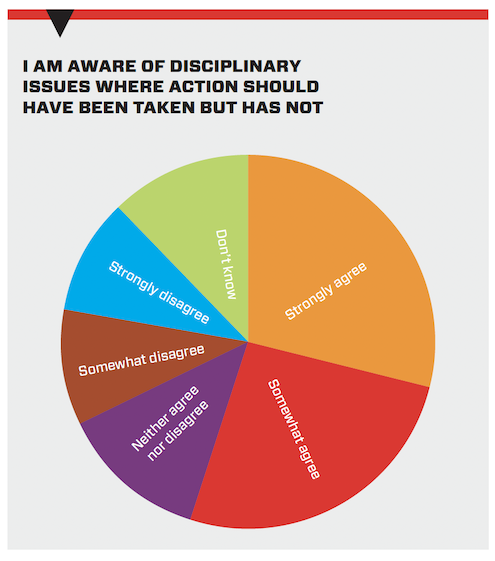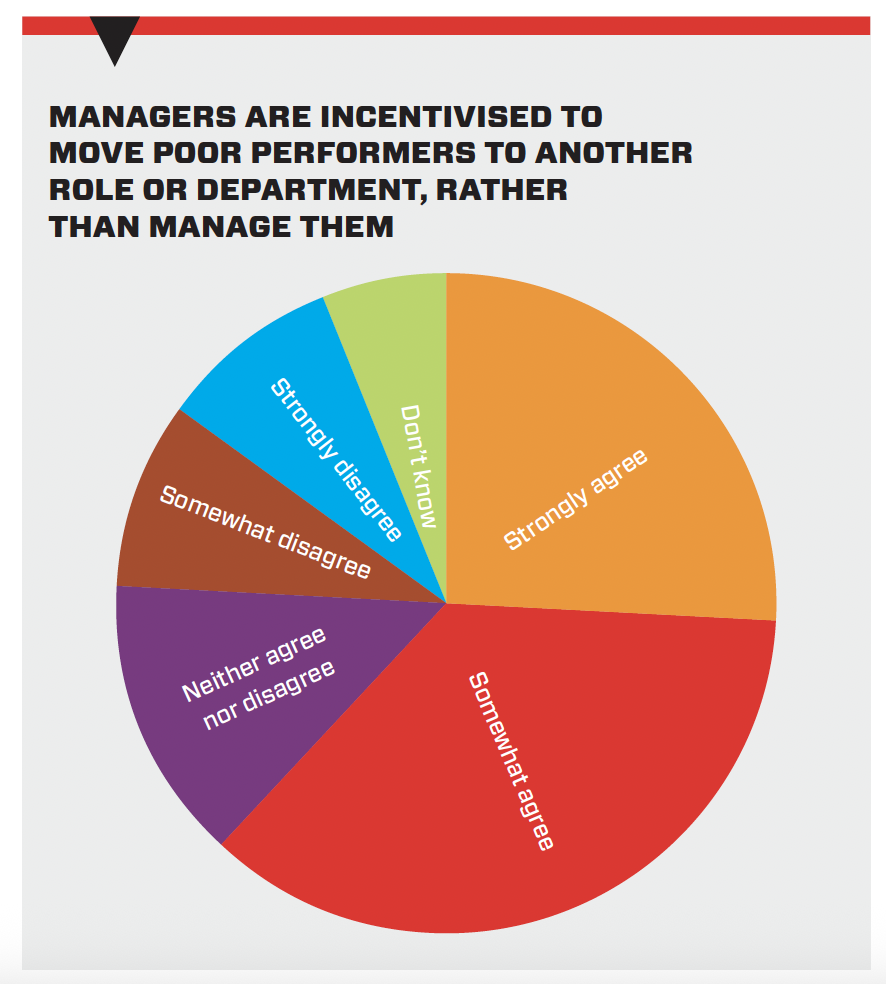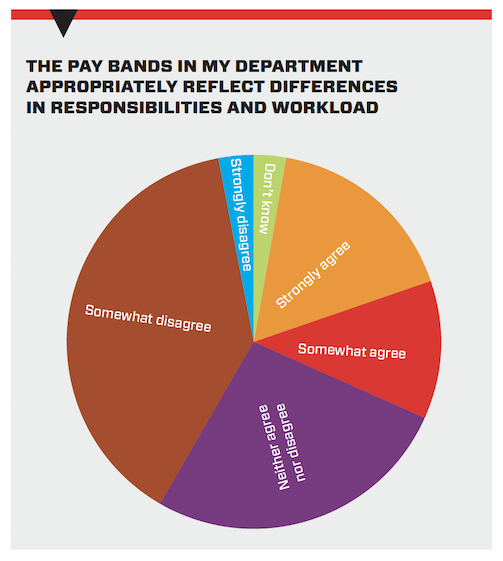Pat McFadden has said failure to tackle poor performers is “one of the biggest barriers” civil servants face. But what do CSW readers think of how performance management is handled?
Ministers have told departments to “go further” to ensure they are managing their senior officials well – shortly after research by CSW and think tank Re:State showed officials aren’t convinced the civil service takes performance management seriously.
In August, the Cabinet Office released figures from a cross-government audit that found only seven reported cases of senior officials being on performance-development plans.
It said changes to the performance-management regime unveiled in February had “supported an increase” in the number of senior officials being rated as having partially met their performance targets, from 3% in 2023-24 to 4% last year. The SCS performance framework introduced new minimum standards and an annual “cross-government consistency check”.
But the Cabinet Office said departments “have been told to go further, to ensure the civil service is delivering for working people”. In a statement, then-Cabinet Office minister Pat McFadden said the civil service needs to be “firing on all cylinders” to deliver the government’s priorities, and that the failure to tackle poor performance is “one of the biggest barriers” civil servants say they face.
He cited figures from the last Civil Service People Survey, in which 31% of officials who were planning to leave within a year said they were doing so because of poor leadership, and 27% did not select either “strongly agree” or “agree” with the statement: “I think that my performance is evaluated fairly.”
CSW and Re:State’s research bears McFadden’s claim out. Of the 1,265 officials who took part in our Alternative People Survey, nearly four out of five disagreed with the statement: “The civil service in general manages poor performance well.”
Less than a third – 29% – said they believe the civil service takes talent and performance management seriously; and more than half – 55% – agreed with the statement: “I am aware of disciplinary issues where action should have been taken but has not.”
 The Alternative People Survey aims to answer questions the People Survey does not. It asks 24 questions on themes including talent and performance management; departmental performance; procurement; and technology and artificial intelligence.
The Alternative People Survey aims to answer questions the People Survey does not. It asks 24 questions on themes including talent and performance management; departmental performance; procurement; and technology and artificial intelligence.
We also included a free-text question: “Would you like to confidentially share any other views or experiences of the civil service or your department?” Poor performance was one of the most frequent topics raised in response, along with a lack of pay progression and recruitment issues. One respondent said where they work, there is “effectively no performance management system to speak of, beyond triggering escalatory action for egregious behaviour”. Another said removing the 10% of lowest-performing staff in their organisation would “mean we’d be more efficient and get more work done”.
Someone else said they believe managers are “too scared or unwilling to have difficult conversations, meaning poor performance is always overlooked”.
The responses are “not a surprise, but that doesn’t make it any less frustrating”, according to Joe Hill, policy director at Re:State and a former civil servant. “It’s an open secret in the civil service that you can’t get rid of repeat poor performers,” he said.
 We asked civil servants whether they believe managers are incentivised to move poor performers to another role or department, rather than manage them. A quarter of them strongly agreed with the statement and a third somewhat agreed.
We asked civil servants whether they believe managers are incentivised to move poor performers to another role or department, rather than manage them. A quarter of them strongly agreed with the statement and a third somewhat agreed.
The results echo a phenomenon in the US school system known as the “dance of the lemons”, Hill said – in which “poor performers get passed around by schools because it’s easier than firing them”.
“In extreme cases in the civil service, it can be in your interest as a manager to actually see poor performers get promoted, if that’s what gets them out of your hair,” he added.
Nevertheless, the majority of respondents – 63% – said they agreed, fully or in part, that they have a good line manager and feel supported by them to make progress.
Our questions also revealed mixed feelings about HR functions. Nearly half (47%) said they understand the role the HR function plays in their department, while just over a third (35%) did not.
The written responses to this question also revealed concerns about corporate HR functions – with one official saying: “We could make massive efficiency savings if we had a fundamentally different approach to HR. Our pay systems and structures are not designed in a way that motivates or rewards high performance and it is incredibly difficult to address poor performance.”
“The lack of consistent HR support is hampering effectively managing people out of the door,” another said, pointing to the “long-winded” process they described as open to exploitation by underperforming officials who “know how to play the game”.
Opportunities for progression
The survey also revealed widespread dissatisfaction with opportunities for progression. Three out of five respondents disagreed with the statement that “talented people rise to the top of the civil service” and only around one in three (37%) agreed that “there are opportunities to progress which makes a future career in the civil service an exciting prospect”.
 The results were even more stark when officials were asked about their feelings on pay – with just a fifth agreeing that “the pay bands in my department appropriately reflect differences in responsibilities and workload”. Two-thirds disagreed.
The results were even more stark when officials were asked about their feelings on pay – with just a fifth agreeing that “the pay bands in my department appropriately reflect differences in responsibilities and workload”. Two-thirds disagreed.
Responding to the free-text question, one official wrote: “The civil service creates some of its own problems by not grasping the fact that the only way to get a pay rise these days is to bounce around jobs.” Another said: “Strong performers are stuck with little promotion opportunities and no rewards, pay or otherwise, for excelling.”
Another said: “I have never seen talented colleagues so demoralised.”
Carrots and sticks
Another respondent summed up the findings on performance and talent management by saying there are “not enough sticks for poor performers and not enough carrots for high performers”. Re:State has said it is “vital that this action is bold and taken swiftly” to address this absence of carrots and sticks.
Asked what this should look like, Hill said the civil service “should reconsider its strategy on the workforce reductions it’s making right now”. Voluntary exit schemes are under way in several departments in an effort to reduce the civil service headcount – but Hill said such schemes are “the worst way to encourage a high-performing workforce”.
“The people with the most incentive to take a payout and leave are people who are confident they can get another job easily, ie your best people,” he said. “Repeat poor performers know that anywhere else they’d be sacked, so they’re not going to leave. Over time, that’s a recipe for disaster. Rounds of performance-based decisions to manage people out the organisation, and compulsory redundancy schemes, would be a much better place to start.”
More views from the Alternative People Survey…
…on performance management
“Line management is the single biggest issue, managers are too scared or unwilling to have difficult conversations, meaning poor performance is always overlooked.”
“Poor performance is not dealt with promptly and often nothing is dealt with. Many people in my department have been promoted way beyond their capability.”
“People seem unsackable, with people on year-long performance plans still not considered ‘signed off’ or just left to it and given a slap on the wrist when they are randomly spot checked [on their decisions].”
…on HR
“The lack of consistent HR support is hampering effectively managing people out of the door. The process is so long-winded and the taxpayer is left paying the bill for people who should be dismissed promptly yet know how to play the game.”
“HR are risk averse and unhelpful, [giving] inconsistent advice, too removed from the reality of leading and managing people at scale... Provide HR processes which enable us to have consistency and fairness but which are simple and straightforward to use to support people, including applying penalties/dismissal for poor performance.”
…on opportunities for progression
“Unrecognised good performance [is] becoming increasingly problematic for keeping up motivation and keeping talent.”
“I genuinely believe the civil service can still be a great place to work, however the lack of pay progression and opportunities for advancement mean that people end up department-hopping to get on.”
“There are limited rewards for exceptional delivery and minimal consequences for poor performance at all levels of seniority.”
“Promotion prospects are currently dire, and pay is not great.”
This article first appeared in CSW's autumn 2025 issue, out now